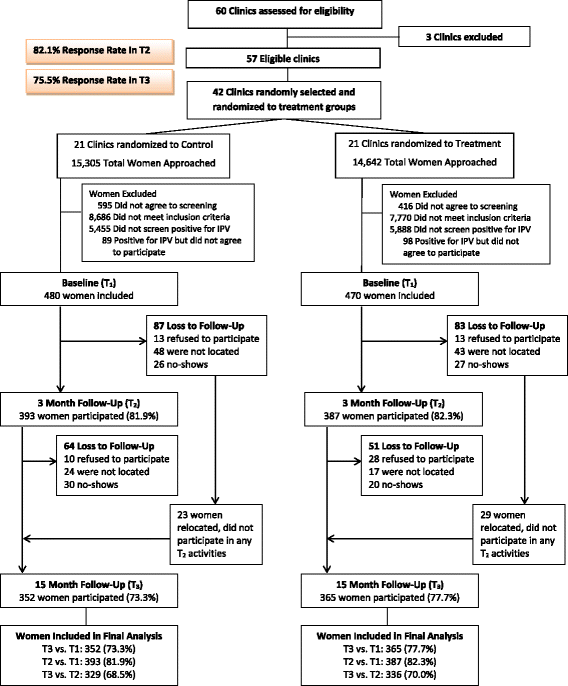A nurse-delivered, clinic-based intervention to address intimate partner violence among low-income women in Mexico City: findings from a cluster randomized controlled trial
- PMID: 28697769
- PMCID: PMC5506677
- DOI: 10.1186/s12916-017-0880-y
A nurse-delivered, clinic-based intervention to address intimate partner violence among low-income women in Mexico City: findings from a cluster randomized controlled trial
Abstract
Background: Rigorous evaluations of health sector interventions addressing intimate partner violence (IPV) in low- and middle-income countries are lacking. We aimed to assess whether an enhanced nurse-delivered intervention would reduce IPV and improve levels of safety planning behaviors, use of community resources, reproductive coercion, and mental quality of life.
Methods: We randomized 42 public health clinics in Mexico City to treatment or control arms. In treatment clinics, women received the nurse-delivered session (IPV screening, supportive referrals, health/safety risk assessments) at baseline (T1), and a booster counselling session after 3 months (T2). In control clinics, women received screening and a referral card from nurses. Surveys were conducted at T1, T2, and T3 (15 months from baseline). Our main outcome was past-year physical and sexual IPV. Intent-to-treat analyses were conducted via three-level random intercepts models to evaluate the interaction term for treatment status by time.
Results: Between April and October 2013, 950 women (480 in control clinics, 470 in treatment clinics) with recent IPV experiences enrolled in the study. While reductions in IPV were observed for both women enrolled in treatment (OR, 0.40; 95% CI, 0.28-0.55; P < 0.01) and control (OR, 0.51; 95% CI, 0.36-0.72; P < 0.01) clinics at T3 (July to December 2014), no significant treatment effects were observed (OR, 0.78; 95% CI, 0.49-1.24; P = 0.30). At T2 (July to December 2013), women in treatment clinics reported significant improvements, compared to women in control clinics, in mental quality of life (β, 1.45; 95% CI, 0.14-2.75; P = 0.03) and safety planning behaviors (β, 0.41; 95% CI, 0.02-0.79; P = 0.04).
Conclusion: While reductions in IPV levels were seen among women in both treatment and control clinics, the enhanced nurse intervention was no more effective in reducing IPV. The enhanced nursing intervention may offer short-term improvements in addressing safety planning and mental quality of life. Nurses can play a supportive role in assisting women with IPV experiences.
Trial registration: Clinicaltrials.gov ( NCT01661504 ). Registration Date: August 2, 2012.
Keywords: Health sector; Intimate partner violence; Latin America and the Caribbean; Randomized controlled trial; Safety planning; Screening; Violence against women.
Comment in
-
Healthcare system responses to intimate partner violence in low and middle-income countries: evidence is growing and the challenges become clearer.BMC Med. 2017 Jul 12;15(1):127. doi: 10.1186/s12916-017-0886-5. BMC Med. 2017. PMID: 28697810 Free PMC article.
References
-
- WHO, Department of Reproductive Health and Research, London School of Hygiene and Tropical Medicine, South African Medical Research Council . Global and regional estimates of violence against women: prevalence and health effects of intimate partner violence and non-partner sexual violence. Geneva: WHO; 2013.
Publication types
MeSH terms
Associated data
Grants and funding
LinkOut - more resources
Full Text Sources
Other Literature Sources
Medical
Miscellaneous


